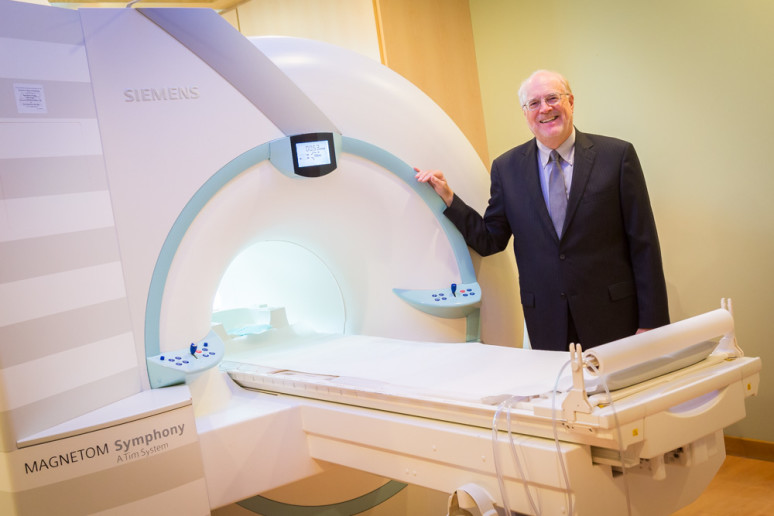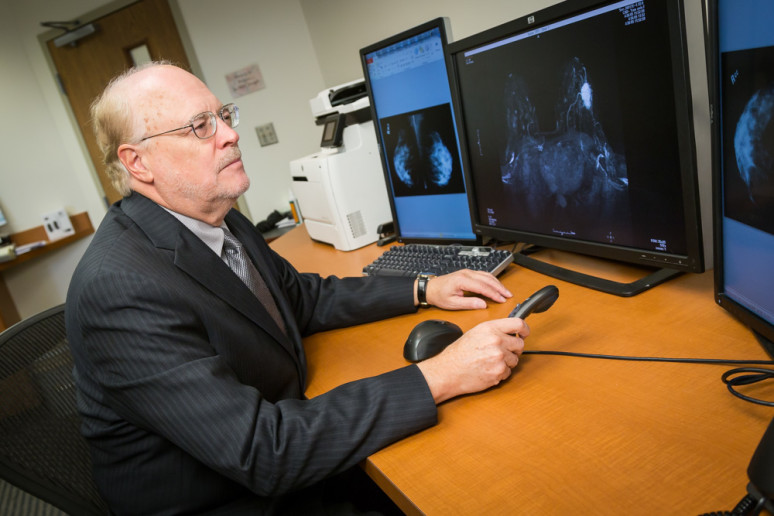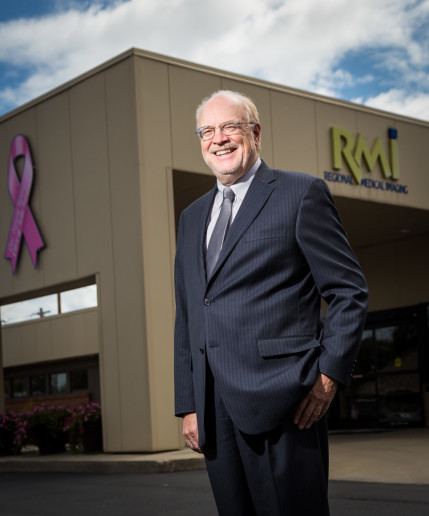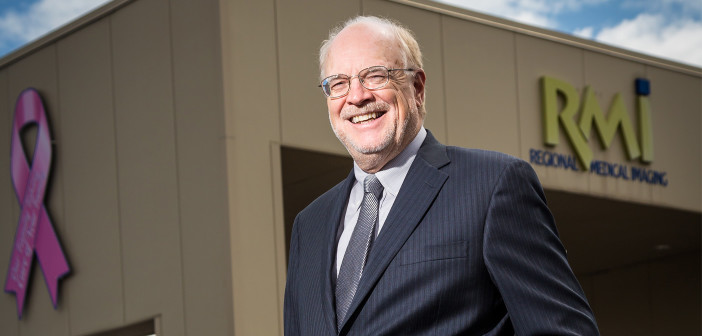For decades, a mammogram was a woman’s only choice for breast cancer screening. However, after seven years of tedious research, a local doctor, David A. Strahle, MD has perfected an alternate screening method – specifically for women who have dense breast tissue.
The founder of Regional Medical Imaging (RMI), Dr. Strahle was the principal investigator of the research along with a very talented team. With the ability to detect breast cancer up to six years sooner than other current technology, his Rapid Breast MRI screening study has the potential to save the lives of thousands of women The findings, published earlier this year in the journal, Breast Cancer Research and Treatment, was the culmination of those seven years. “If women with dense breasts knew what I know, they would all seek screening with MRI instead of a mammogram,” the doctor says.
Background
Born and raised in Flint, Dr. Strahle graduated from Southwestern High School and obtained a degree in Aerospace Technology at Kent State University. Following his graduation, he began a very successful career working for IBM in Detroit. Throughout that time, he also worked as a flight instructor as was very passionate about aviation.
“One of my students told me I should consider becoming a physician,” Strahle remembers, and that got him thinking about a career change. He eventually left IBM to attend Michigan State University College of Human Medicine, with an interest in radiology. After completing his residency in 1985, he opened the RMI facility on Lennon Road in Flint. “The business has grown over the years, and we are now one of the largest private radiology facilities in Michigan,” he states.
 Aviation and Breast Cancer
Aviation and Breast Cancer
So, how could aviation have anything to do with breast cancer? A few years back, Strahle received a phone call from a former aviation student – Major General Vernon Andrews, Adjutant General of the Michigan National Guard, whose daughter was dying from breast cancer. Due to her dense breast tissue, the cancer had not been detected by mammography. The General recalled prior aviation research Strahle had conducted that improved radar’s ability to detect thunderstorms hidden by dense clouds. General Andrews thought that Dr. Strahle’s radar research could be applied to the breast MRI process, which was in its early stages at that time.
“He got me thinking of a way to improve breast imaging,” Strahle explains. “Trying to find cancer using mammography in women with dense breast tissue is just as difficult as finding a thunderstorm hidden by dense clouds.”
 The Research
The Research
Dr. Strahle was able to begin his research thanks to a $1 million donation from Dearborn County Hospital in Southern Indiana. From 2009-2011, 671 women who had a negative mammogram within the prior 30 days were re-scanned, at no cost, with breast MRI.
Out of the 671 scanned, there were 452 missed lesions (both benign and malignant) discovered in 234 women. It was determined that 55 percent of the women who were scanned had dense breast tissue of 50 percent or greater and all the “misses” were in that group.
The research also revealed the ability to cut down the MRI scan time from 28 minutes to just six minutes. Cutting the procedure time reduced the MRI costs by 70 percent, the doctor says. The research also resulted in an easier method of interpreting MRI exam results, which lowered the false-positive rate below that of any other breast-screening method.
According to Strahle, the purpose of the research was to identify any cancers missed by a mammogram, to evaluate the role that dense fibroglandular tissue plays in hiding breast cancer, to determine whether a limited number of MRI sequences could be developed for a national screening program, and to discuss the impact a national MRI screening program might have on saving lives and reducing costs. “It took two years to collect the data, three years to analyze the data, and two years to write the paper,” Strahle adds.
Potential Savings
Strahle then was asked by a prominent Michigan HMO to estimate how much money could be saved by earlier breast cancer diagnoses. Together, they discovered savings in ten categories: reduced mastectomies, reduced requirements for chemotherapy, reduced requirements for radiation treatment, reduction of extra dollars spent attempting to treat patients who eventually die from the disease, reduction in loss of personal income, reduction in expenses incurred by families of breast cancer patients, marked reduction in lawsuit expense, marked reduction in reconstructive surgeries, reduction in office visits due to advanced disease, and continuation of insurance premiums by women who survive the disease. “If insurance companies adopted this process, they would see a return on investment of over 2,000 percent, which would begin eight months into the process,” Strahle reports.
 At Present
At Present
To promote the benefits of the Rapid Breast MRI exam, Strahle spends a lot of time traveling around the country. Since the research was published, six other institutions have installed the Rapid Breast MRI protocol and several others are in the process. After this research, RMI has become one of the leading breast MRI centers in the U.S. and is recognized as such by the American College of Radiology.
So far this year, over 200 women have had Rapid Breast MRI screenings at RMI.
“We are happy to provide this service to the women of our community who have dense breast tissue,” Strahle said. A physician’s referral is preferred, but walks-in are welcome at the facility. Two well-known women actually came all the way from Hollywood to Michigan for screenings. “One woman’s result was negative, but we actually picked up three early-stage cancers in the other,” Strahle states.
Since the time he started his practice, 1.2 million women have died from breast cancer in the nation. In the last 12 months, 88,000 women had mammograms in Genesee County, from which 238 cancers were detected. Based on his research statistics, 715 cancers were missed in women with dense breasts in Genesee County, alone. “Had we screened those women with MRI, the cancers would have been found at a very early stage,” he says.
Perhaps Dr. Strahle was destined to do the work he does. He recently learned that in the German language, the name Strahle means “ray,” as in x-ray or radar.
Strahle believes the most important factor in stopping breast cancer deaths is to find it super-early. “Forget what’s causing it,” he says. “Find it and kill it and go on living your life. We now have the technology to detect breast cancer early enough to break the chain; we can keep women from dying of this disease.”
The rapid breast MRI has the ability to detect cancer up to six years sooner than other current technology.
The american college of radiology recognizes rmi as a leading breast mri center.
“We now have the technology to detect breast cancer early enough to break the chain; we can keep women from dying of this disease.”
David Strahle, MD















